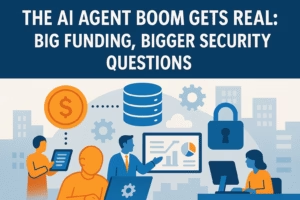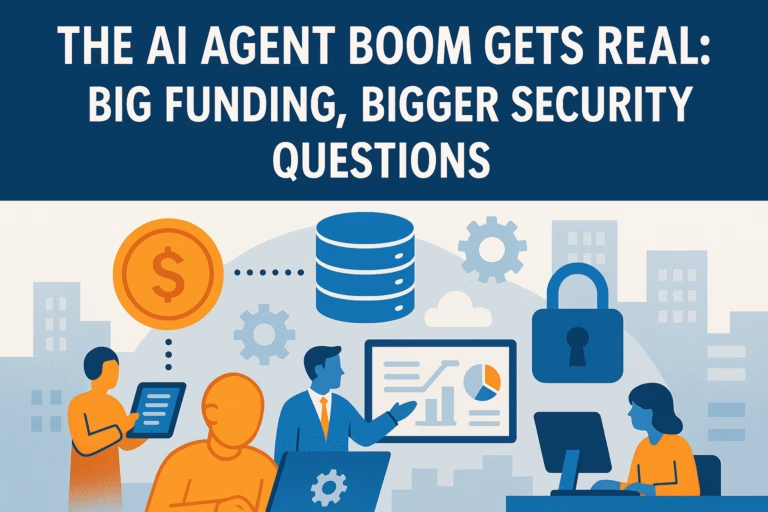- AI agent startups raised more than 85 million dollars this week which signals a new growth phase.
- Security now sits at the center since agents can access sensitive company data and systems.
- Enterprises want trust, transparency, and compliance before allowing agents into production.
- Smaller teams can automate safely with tools like Blaze Autopilot which keeps humans in the loop.
- The shift from experiments to real world deployment is underway and moving fast.
Something important is happening in the world of AI. For years, people talked about “agents” like they were some futuristic dream. Now they are here, fully funded and finally being trusted with real work.
This week alone, three companies working on AI agents secured more than 85 million dollars. That is not theory. That is investors betting that these virtual workers will soon become part of everyday business.
In 2025, the AI agent revolution is no longer a lab experiment. It is entering production. The conversations have shifted from “can they work” to “how do we keep them safe.”
Companies are realizing that if these digital assistants are going to touch financial data, emails, and systems, they need the same level of trust as human employees. That new focus is where the real story begins.

The Money Flood
Investors have officially turned their attention to agent startups. The biggest splash came from Keycard Labs, which raised 38 million dollars from well known names like Andreessen Horowitz, Boldstart, and Acrew Capital.
Their goal is simple to say but hard to build: make sure AI agents get the right access to the right things, nothing more.
They are not alone. Fermat and Converge AI also announced funding rounds to expand their agent platforms. Fermat is focused on creative automation for marketing and design teams.
Converge AI is building orchestration tools for enterprise agents that can coordinate multiple systems at once.
All this money means one thing. The market is finally confident that AI agents can deliver real results. Startups are not chasing hype anymore.
They are building the backbone of automation that might soon handle customer service, internal reporting, and even compliance tasks.
The Security Wake-Up Call
The rush of new funding has opened a second conversation that is just as serious: how do you keep agents safe once they start touching private systems?
Most AI models today can read and act on information faster than any human. That is powerful but also risky.
Keycard Labs calls it the access control problem.
Their founder Ian Livingstone compared agents to new employees who arrive before HR sets up permissions. If you give them too much freedom, they can accidentally reach files or data they should never see. This is the same security issue that once slowed down cloud adoption.
Experts at TechCrunch and VentureBeat have already pointed out that security and compliance will define the next wave of agent growth.
Companies that ignore this could face serious data leaks or trust issues. The next big winners in this space will not just build faster agents. They will build safer ones.
The Enterprise Shift
Large organizations are no longer waiting for the technology to mature. They are testing AI agents inside real operations. Banks are using them for client onboarding.
Retail chains are testing them for logistics. Even government offices are quietly experimenting with internal chat assistants.
The pattern feels familiar. In the early 2010s, businesses raced to adopt cloud systems because they promised speed. Then the fear set in. People worried about leaks, audits, and compliance.
That same cycle is repeating now with AI agents. First came excitement. Then came questions. Now comes the stage of standards and accountability.
For individual creators and startups, this is the best time to learn the rules of automation before they harden. Tools like Blaze Autopilot already handle automation safely by keeping human oversight in the loop.
You can build smart systems without risking your data. The smart move in 2025 is not to rush but to automate with awareness.
What This Means for You
For everyday creators and business owners, all this activity signals one thing. The tools that once seemed out of reach are now being built for real users.
You no longer need a tech team to run AI agents. What you do need is clarity on what to automate and what to keep human.
A small online store can now use agents to manage customer queries or track orders without exposing sensitive payment data. A freelancer can use an agent to handle research or draft reports while maintaining control over personal files.
The blend of power and protection is what defines this new stage.
More people will start calling themselves “agent operators.” These are humans who supervise AI agents, set boundaries, and check results. It is a new type of digital job, much like “social media manager” was a decade ago.
If you are running an online business, you are already halfway there. The best part is that automation can now be done safely with tools such as Blaze Autopilot which help streamline repetitive work while keeping your systems secure.


